|
|
|
Sort Order |
|
|
|
Items / Page
|
|
|
|
|
|
|
| Srl | Item |
| 1 |
ID:
190074
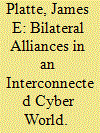

|
|
|
|
|
| Summary/Abstract |
During the Cold War, US extended deterrence commitments mostly focused on deterring nuclear or strategic conventional attacks against allies in Europe and Asia. In the decades following the end of the Cold War in the early 1990s, the emergence of new technologies and domains for conflict, particularly the cyber domain, prompted new thinking for alliance management and extended deterrence. In this article I explore how the system of US bilateral alliances and informal strategic groupings in the Indo-Pacific affects the crafting of allied cyber deterrence strategies in the region. Based on deterrence and alliance theory, I survey cyber threats faced by US allies and partners in the region and views of cyber deterrence to form a general framework of allied cyber deterrence strategy. The US-South Korea alliance is used as a case study for allied cyber deterrence strategy, with a special focus on the impact that South Korea assuming wartime operational control of allied military forces could have on cyber deterrence on the Korean Peninsula. Just as concepts of extended deterrence had to evolve, the cyber domain will force the United States and allies to reconceptualize peacetime and wartime operational control.
|
|
|
|
|
|
|
|
|
|
|
|
|
|
|
|
| 2 |
ID:
190073


|
|
|
|
|
| Summary/Abstract |
China has developed space capabilities with astonishing speed and scope, inviting both admiration and concern. China’s space development spans scientific exploration, business applications, and humanitarian, military, and diplomatic purposes. The existing studies on China’s space capabilities tend to focus on just one of these areas and do not provide a comprehensive understanding of how and why China has been determined in its pursuit of space. This study addresses China’s motivation by analyzing Chinese official documents and other supporting documents and information. At its crux, this study argues that China is driven to develop its space capabilities because they support the Chinese Communist Party’s longevity in power by strengthening its legitimacy to rule the nation.
|
|
|
|
|
|
|
|
|
|
|
|
|
|
|
|
| 3 |
ID:
190075
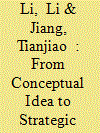

|
|
|
|
|
| Summary/Abstract |
Chinese scholars’ research on “Indo-Pacific Strategy” has undergone two shifts. Firstly, they began to pay limited attention to the Indo-Pacific concept and the US Indo-Pacific regional strategy in 2013. With 2017 and 2018 as the turning point, the attention to the Indo-Pacific strategy shows a significant increase. Secondly, regarding the scholars’ judgment of the Indo-Pacific strategy, since the end of 2019, they reach a consensus on their assessment of the strategy, especially on its threat to China. The two main reasons that drove the above shifts were the enrichment of the Indo-Pacific Strategy by the United States and China’s perception of India’s attitudes. China’s official responses to the strategy have shown a co-moving rhythm with scholars’ research, shifting from a more open and neutral attitude toward the concept to a critical one. Against the background of America’s continuing effort to implement the Indo-Pacific strategy, China’s policy responses can focus on three aspects: do a good job of itself, handle China-US relations peacefully and cooperatively, and break down the group politics.
|
|
|
|
|
|
|
|
|
|
|
|
|
|
|
|
| 4 |
ID:
190072
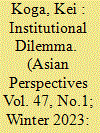

|
|
|
|
|
| Summary/Abstract |
How is the future of the Indo-Pacific institutional arrangements envisioned by the Quad and ASEAN? Are they mutually exclusive or compatible? How can the institutional competition between the Quad and ASEAN in the Indo-Pacific be avoided? I argue that the institutional competition between the Quad and ASEAN can be provisionally alleviated through strategic ambiguities about the institutional division of labor in the Indo-Pacific. However, such strategic ambiguities do not resolve normative inconsistencies between the Quad and ASEAN, which would probably trigger institutional competition in the future. To resolve such difficulties, both the Quad and ASEAN need to create a mechanism that clarifies their regional institutional division of labor.
|
|
|
|
|
|
|
|
|
|
|
|
|
|
|
|
| 5 |
ID:
190076
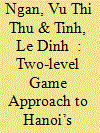

|
|
|
|
|
| Summary/Abstract |
In this article we elucidate the evolution of Hanoi’s foreign policy proactivism which has been understudied in the contemporary literature. In selective areas, why has Vietnam adopted a more proactive foreign policy than before? By means of ‘two-level game’ theory, official documents and research papers, and expert interviews, we analyze the foreign policy of Vietnam and compare it with that of Indonesia, ASEAN’s de facto leader, by examining the former’s role in the South China Sea issue and international economic integration strategy. In these aspects which Vietnam today has evinced its sectoral leadership, compared to Indonesia, the country has faced fewer constraints in domestic and international strategic environments to exert its diplomatic proactivism.
|
|
|
|
|
|
|
|
|
|
|
|
|
|
|
|
| 6 |
ID:
190071


|
|
|
|
|
| Summary/Abstract |
Innovations in technologies coupled with evolving military thinking have led to advanced emerging military technologies ranging from artificial intelligence, lethal autonomous weapons, hypersonic weapons, directed energy weapons, biotechnology, and quantum technology. These technologies not only open new domains in warfighting capabilities and strategy by changing the size and speed of destructions but may also bring challenges in curbing arms race, managing networks, and achieving peace and security. This study examines the rising significance of emerging technologies in Indo-Pacific security and further explores US strategies for building, dominating, and managing the different networks of technologies, domains, command and control (C2), alliances, and partners. As advanced technologies play a critical role in supporting national strategic goals, as in the case of China, it seems clear that the future of strategic competition will be dictated by who builds, dominates, and manages these networks and how one does it most effectively with clear strategic vision. In this paper I argue that networks are crucial in understanding emerging technologies and Indo-Pacific strategy for the unfolding era of strategic competition.
|
|
|
|
|
|
|
|
|
|
|
|
|
|
|
|
| 7 |
ID:
190077
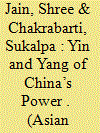

|
|
|
|
|
| Summary/Abstract |
The Pew Research Center survey reports an increasing unfavorable view of China worldwide. In the Soft Power 30 index, China fares at a rank of 27th, far behind its aim of global leadership. The world’s leading economic power (in terms of purchasing power parity), a military power second only to the United States, a nation with a formidable global presence, a robust civilization and culture, however, still struggles to generate international affinity and credibility one might expect of the great middle kingdom. Acknowledging the benefits of soft power, China has continuously been engaged in the competitive politics of attraction, legitimacy, and credibility; however, Beijing’s charm offensive still has limited appeal in the outside world. The popular assessments point toward China’s authoritarian political model or poor state of civil liberties for the limited effectiveness of its soft power push. However, in this article we argue that besides the political and ideological factors limiting its soft power, China’s absolute or relative soft power gains are majorly undercut because of its coercive diplomacy exercised with the unbridled pursuit of its core national interests and hyper-nationalism. The article provides an interpretive illustration of how China’s disposition to rely on hard power instruments of carrot (inducement) and stick (threat, coercion, or intimidation) to get desired outcomes undermines the quest and effect of its soft power.
|
|
|
|
|
|
|
|
|
|
|
|
|
|
|
|
|
|
|
|
|